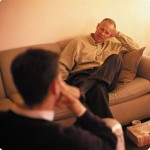Individual Counselling Group Therapy Family Counselling
Individual Counselling
 The type of therapy offered in an individual setting will depend on your specific situation; actively using, in recovery, relapsed, or if you are the loved one of an addict. Whatever your circumstances may be, I will provide you with a personalized assessment, followed by education, guidance, and support.
The type of therapy offered in an individual setting will depend on your specific situation; actively using, in recovery, relapsed, or if you are the loved one of an addict. Whatever your circumstances may be, I will provide you with a personalized assessment, followed by education, guidance, and support.
When treating an addict, it is important to realize that the addiction is never the root of the problem, rather, it is the wrong solution to a problem. Most often, the real problem is unresolved trauma, low self-esteem, or the tendency to suppress emotions. Therefore, in addition to helping the addict deal with the new problem, the addiction, the counselling will also have to focus on these underlying problems. It is only by recognizing and treating these issues that an addict can truly be considered a recovering addict.
Group Therapy
Group therapy has been proven to be a very powerful therapeutic tool for people struggling with addictions. Despite the understandable hesitations that you may have when you think about sharing in a group setting, all my clients have reported feeling very comfortable and relaxed by the end of the very first session.
Addicts tend to feel very isolated.You feel isolated from your family and friends and even from other addicts. The power of the group can help you realize that you are not alone in your struggles and that your issues are not unique. Those that have been through similar situations can help you through the dark times. The opportunity to listen to the hopes and fears of others who have been down the same path has been found to be very rewarding. Clients can identify with what another addict is talking about, and you can then use what they’ve heard in group therapy to help yourself in your own healing process.
Group therapy offers the client a chance to receive and provide feedback to others. This type of feedback, client to client, is very enlightening and often plays a major role in the client’s recovery.
Group therapy also gives you the opportunity to develop your social and interpersonal skills. These skills were most likely lacking during your addiction and learning how to communicate respectfully and effectively with the greater community is crucial for maintaining sobriety.
Click here to learn more about our group, New Beginnings, which was designed for those struggling with compulsive sexual behaviours.
Family Counselling
 There are two primary purposes for the addict’s family to go for therapy.
There are two primary purposes for the addict’s family to go for therapy.
Most family members enable the addict’s behavior without even realizing it. If they do realize what they are doing, they are generally not going to stop; either to order to avoid confrontation or because they think that they will cause the addict more harm if they were to stop some of their behaviors. I will help you understand why stopping all enabling behaviors is of paramount importance. I will help you recognize how you are in fact enabling your loved one and we will then plan how you can stop all enabling activities so that the addict will eventually seek treatment.
Whether you are the child, parent, sibling, spouse, or partner of the addict, your life has been impacted severely. The addict is destroying his life, but he is also destroying his family’s life. The family of an addict needs counselling and support to help them through this extremely difficult and painful chapter.
Click here to learn more about addiction and the family.

